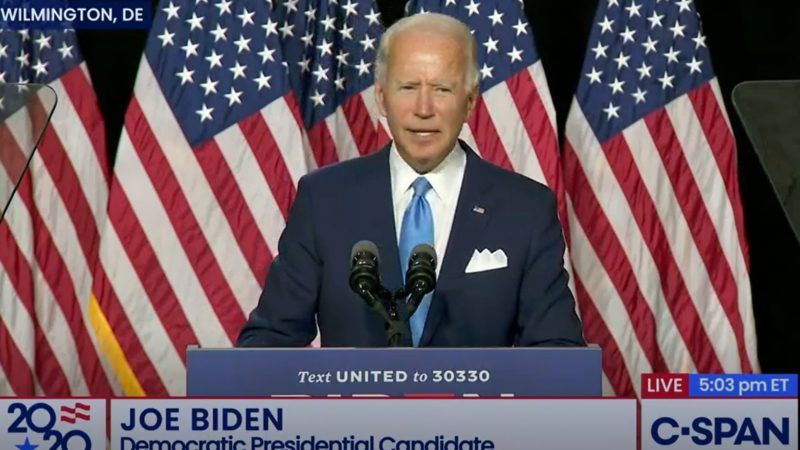Rejecting Biden's Threat of a Nationwide Mask Mandate, Trump Suddenly Respects Limits on Presidential Power
Both major parties defend the Constitution only when it's convenient.

Democrats, who routinely complain about Donald Trump's power grabs when they do not like the results, quickly change their tune when they see presidential orders as the easiest way to impose a nationwide policy they favor. Trump, meanwhile, never hesitates to assert authority he does not have, except when it comes to policies he opposes.
That utterly unprincipled approach to executive power is vividly illustrated by the debate between Trump and Democratic presidential candidate Joe Biden about face mask mandates, which yesterday led Trump to utter these words: "If the president has the unilateral power to order every single citizen to cover their face in nearly all instances, what other powers does he have?" This is the same man who last April asserted "total" authority over COVID-19 lockdowns, saying "the president of the United States calls the shots."
Trump's sudden respect for constitutional limits was inspired by Biden's suggestion that as president he would require Americans to wear masks in public. "These masks make a gigantic difference," he said in a June 25 interview with a local TV reporter in Pittsburgh. "I would insist that everybody out in public be wearing that mask." When asked if he would "use your federal leverage to mandate that," Biden replied: "Yes, I would. From an executive standpoint, I would….I would do everything possible to make it required that people had to wear masks in public."
At a press conference in Wilmington, Delaware, yesterday, Biden reiterated his support for face mask mandates. "Every governor should mandate mandatory mask wearing," he said. "It's not about your rights. It's about your responsibilities as an American."
This time around, Biden did not mention the possibility of a presidential order. But in comments to reporters yesterday evening, Trump argued that there is no legal basis for such a mandate.
"He wants the president of the United States, with the mere stroke of a pen, to order over 300 million American citizens to wear a mask for a minimum of three straight months…no matter where they live," Trump said. "He does not identify what authority the president has to issue such a mandate or how federal law enforcement could possibly enforce it or why we would be stepping on governors throughout our country, many of whom have done a very good job and they know what is needed."
While "we have urged Americans to wear masks," Trump said, "we've entrusted the governors of each state, elected by the people, to develop and enforce their own mask policies….We will continue to urge Americans to wear masks when they cannot socially distance, but we do not need to bring the full weight of the federal government down on law-abiding Americans to accomplish this goal."
That federalist approach is strikingly different from the position that Trump took last spring, when he said he alone had the authority to decide when COVID-19 lockdowns should be imposed and when they should be lifted. That was a gross mischaracterization, since states have broad authority to combat communicable diseases under their general "police power," while the federal government is limited to public health measures derived from its power to regulate foreign and interstate commerce. Even if Congress were inclined to cite the Commerce Clause as a justification for lifting state lockdowns, the president would have no authority to act without new legislation.
As the Princeton political scientist Keith Whittington noted at the time, "The governors issued their shut-down orders based on their own statutorily granted emergency powers that are in turn grounded in the constitutional police power of the states to make such regulations as might be necessary to protect the health, safety and welfare of the community. That constitutional authority of the states is independent of the federal government's. States do not need to ask permission from the president or any other federal official before they make use of that authority. Moreover, having issued orders that in their judgment are necessary to protect public health in the midst of an epidemic, governors do not need to seek the president's permission to lift those orders or to keep them in place."
Biden—like Michigan Gov. Gretchen Whitmer, a Democrat who last month urged Trump to impose a nationwide mask mandate—surely would agree with that assessment in this context. Biden does not want the president to override state restrictions on social and economic activity aimed at curtailing the spread of COVID-19. By contrast, he does want the president to override state decisions about whether to require face masks, on the assumption that it will lead to the outcome he wants. Yet if the president has broad authority to dictate public health policies throughout the country, he could just as easily use it to negate mask mandates. He also could use that authority to loosen or eliminate other disease control measures that Biden and his fellow Democrats support.
That's the thing about constitutional limits: They do not guarantee any particular outcome, but they do say who gets to make the decisions. The president can do some things on his own, but others require congressional action. Congress can legislate in certain areas, based on its enumerated powers, but everything else is "reserved to the states respectively, or to the people," as the 10th Amendment makes clear. States have a broad police power, but it is constrained by the constitutional rights they are bound to respect.
Politicians who feel free to disregard these rules whenever they prove inconvenient not only undermine a system that is designed to restrict government power and protect individual freedom; they set a precedent their opponents can use in ways they will not like. The fact that people like Biden and Trump routinely fail to anticipate that possibility reflects an alarming shortsightedness that should disqualify them not only from the presidency but from any public office.


Show Comments (220)